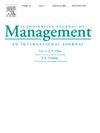Linking ethical leadership to extra-role behaviors: The roles of communal orientation and harmonious work passion
IF 2.5
4区 管理学
Q3 MANAGEMENT
引用次数: 0
Abstract
The current study aims to investigate the relationship between ethical leadership and employees’ project citizenship behavior (PCB) in the construction industry, specifically through the mediating role of communal orientation and the moderating role of harmonious work passion. To appraise the hypothesized nexuses, time-lagged data were collected from 353 employees working in six construction organizations before administering the AMOS 24 and Hayes’ PROCESS macro technique to analyze the proposed associations. The study findings provided empirical evidence for the direct association between ethical leadership and the PCB and the subsequent indirect linkage through the mediating effect of communal orientation. The results also demonstrated that employees’ harmonious work passion significantly moderated the relationship between ethical leadership and the PCB. The theoretical importance of the current study findings assisted in closing the knowledge gap by unveiling the contextual and dispositional PCB antecedents. The study findings offer insight into effective managerial interventions, for policymakers and construction industry managers, to foster PCB and maintain a strong foothold in the hyper-competitive marketplace.
伦理领导与角色外行为的联系:社区导向与和谐工作激情的作用
本研究旨在探讨建筑行业伦理型领导与员工项目公民行为之间的关系,特别是通过社区取向的中介作用和和谐工作激情的调节作用。为了评估假设的联系,在使用AMOS 24和Hayes的PROCESS宏观技术来分析所提出的联系之前,从六个建筑组织的353名员工中收集了时间滞后数据。研究结果为伦理型领导与PCB之间的直接关联以及通过群体取向的中介作用产生的间接关联提供了实证证据。结果还表明,员工的和谐工作热情显著调节了伦理领导与PCB之间的关系。当前研究结果的理论重要性有助于通过揭示背景和性格的PCB前因来缩小知识差距。研究结果为决策者和建筑行业管理者提供了有效的管理干预措施,以促进PCB并在竞争激烈的市场中保持强大的立足点。
本文章由计算机程序翻译,如有差异,请以英文原文为准。
求助全文
约1分钟内获得全文
求助全文
来源期刊

Scandinavian Journal of Management
MANAGEMENT-
CiteScore
4.00
自引率
10.00%
发文量
36
审稿时长
71 days
期刊介绍:
The Scandinavian Journal of Management (SJM) provides an international forum for innovative and carefully crafted research on different aspects of management. We promote dialogue and new thinking around theory and practice, based on conceptual creativity, reasoned reflexivity and contextual awareness. We have a passion for empirical inquiry. We promote constructive dialogue among researchers as well as between researchers and practitioners. We encourage new approaches to the study of management and we aim to foster new thinking around management theory and practice. We publish original empirical and theoretical material, which contributes to understanding management in private and public organizations. Full-length articles and book reviews form the core of the journal, but focused discussion-type texts (around 3.000-5.000 words), empirically or theoretically oriented, can also be considered for publication. The Scandinavian Journal of Management is open to different research approaches in terms of methodology and epistemology. We are open to different fields of management application, but narrow technical discussions relevant only to specific sub-fields will not be given priority.
 求助内容:
求助内容: 应助结果提醒方式:
应助结果提醒方式:


